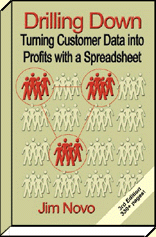Commerce Channel Management
Drilling Down
Newsletter #84 11/2007
Drilling Down - Turning Customer
Data into Profits with a Spreadsheet
*************************
Customer Valuation, Retention,
Loyalty, Defection
Get the Drilling Down Book!
http://www.booklocker.com/jimnovo
Prior Newsletters:
http://www.jimnovo.com/newsletters.htm
========================
Hi Folks, Jim Novo here.
Channels, channels everywhere. Most folks with a new product
to sell would try to jam every channel they could find with the
product, and many do. However, if you are the manufacturer and
looking to maximize end profits, there is probably a smarter way to
use the different channels more strategically. This month we'll
take a look at media and pricing as it relates to a channel sequencing
strategy.
Also on tap, we've got an article on 7 ways customer segmentation
projects can go bad and a blog post on the importance of forecasting
trends in web analytics.
Let's get to that Drillin'...
Best Customer Marketing Articles
====================
The Seven Perils of Segmentation
Most Marketers got their start looking at their tasks through a demographic lens via buying media, and to be fair, changing that mindset to a more behavioral or people-based view is difficult.
But the outcome is very much in synch with the current trend towards Relevance, Respect, and Relationships that so many folks are clamoring about in all the subcultures of Customer Marketing and Social Media.
A behavior-based messaging approach can be the glue that binds all of these ideas together if you match the marketing approach with your segmentation.
To access the full article review and links to the articles
themselves, click
here.
Sample Marketing Productivity Blog Post
==========================
KFI’s: Key Forecast Indicators
November 11, 2007
If you want to get C-Level people to start paying attention to web analytics, you have to get into the business of predicting / forecasting.
Let’s face it, KPI’s are about the past, right? You don’t know “Performance” until it has already happened.
But C-folks don’t really care much about what has already happened, because they can’t do anything about it.
What they really want to know is what you think will happen...Read
Post
Questions from Fellow Drillers
=====================
Commerce Channel Management
Q: We are a manufacturer with a cool product not really on the net and right now,
but we are entering stores. I wonder, is it wise to try to sell on the net before retail markets have the products or
not - is it better to hold off until the retail markets first have the products and then launch them onto the
net? Does the net really help sell products or does it create copy cats?
Trying to find the best way to go - any advice would be greatly appreciated.
A: Great question. Answer is “it depends” and it’s difficult to be more specific without knowing more about the product and your marketing plans.
But in general, if you want to optimize the profitability of the
product launch and you are paying for media, you should think about these choices as a “chain” or series of events each with a specific but interconnected
strategy for each channel.
An example would DRTV or infomercial products, which generally are launched at a higher price into the spot TV channel (cable networks, etc.).
Here sales are made at a very high margin but the volume is generally low; the Objective is to generate awareness and hopefully make a profit, but breaking even is OK because you essentially have the media “free” and that will help drive the next step.
Based on all the awareness you have generated with TV spots, you then can go to the
TV shopping channels and say, “Look, people know this product because we have already pre-sold it for you.
We will let you sell it at a lower price if you will drive volume”.
And that’s typically exactly what happens.
From the spot TV, the audience knows the product sells for $19.95 or whatever, so when it is offered at $14.95 on the shopping channel they think it’s a great deal and the volume is tremendous.
Typically, the spot TV would still be running at this stage, though sales from that channel will have peaked.
Once sales get soft in the TV shopping channel, you then introduce the product online and in stores.
This is essentially “end of lifecycle” for the product, where you are simply trying to make sure you don’t get stuck with any.
You sell that at cost plus to the onliners / retailers and they blow them out at $9.95 or so.
You don’t end up wearing the inventory and everybody is happy because the spot TV / TV shopping has generated plenty of awareness, people pounce on the product, and it moves very quickly through retail.
Typically no TV would be running at this stage because you couldn’t sell any at the original price.
Now, I’m not saying you should follow this model. But what I am saying is the decision you are trying to make is more complex than “should we”, it involves understanding which channel can do what for you and at what price.
For example:
You said you are “entering stores”, but did not say if you / the stores are running any media to support this effort.
If you are not running any media then I would get on the web and sell the product for retail price or higher.
This generates some awareness / demand / trial but preserves the margins of the retail partner, and hopefully your direct profits will cover costs.
You basically get “free media” from the web (as in the spot TV example above) and the retail folks will love it because it will drive sales in their channel.
If you / the retailers are doing a lot of paid media support, then I would not
sell on the web until sales through retail get soft.
Then you are in a position to undersell them or liquidate on the web based on the awareness you have generated offline.
This doesn't mean you should not have a web site, you should, and it
should tell people which retail outlets they can buy the product in.
On the other hand, if there is a razor / razor blade model built into the product (think a doll with add-on sets of clothing), you could sell the primary razor product and some of the blades in retail, then develop more targeted / segmented / rare blade offerings that are exclusive to the web for online stores.
Again, it’s very difficult to make the “right” judgment on this question not knowing anything at all about the product, whether there are supplemental / follow-on products, whether there are continuity pieces involved (collections) and so forth; and especially not knowing what the nature of the retail relationship is.
But I think you get the general idea. You play the strengths of the channels off each other, generally in some sequential way, depending on what the marketing / media plan is and the characteristics of the product.
That is, if you are interested in optimizing media spend versus
sales. If you have an unlimited media / PR budget, then sure,
sell it everywhere!
Hope that helps.
Jim
-------------------------------
If you are a consultant, agency, or software developer with clients
needing action-oriented customer intelligence or High ROI Customer
Marketing program designs, click
here
-------------------------------
That's it for this month's edition of the Drilling Down newsletter.
If you like the newsletter, please forward it to a friend! Subscription instructions are top and bottom of this page.
Any comments on the newsletter (it's too long, too short, topic
suggestions, etc.) please send them right along to me, along with any
other questions on customer Valuation, Retention, Loyalty, and
Defection here.
'Til next time, keep Drilling Down!
- Jim Novo
Copyright 2007, The Drilling Down Project by Jim Novo. All
rights reserved. You are free to use material from this
newsletter in whole or in part as long as you include complete
credits, including live web site link and e-mail link. Please
tell me where the material will appear.
| 
![]()
